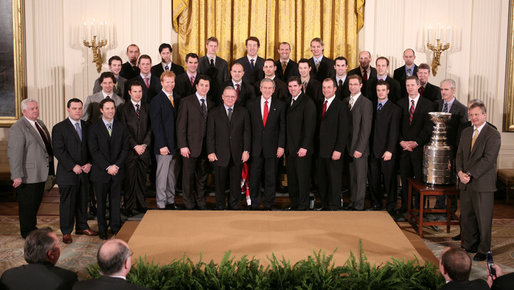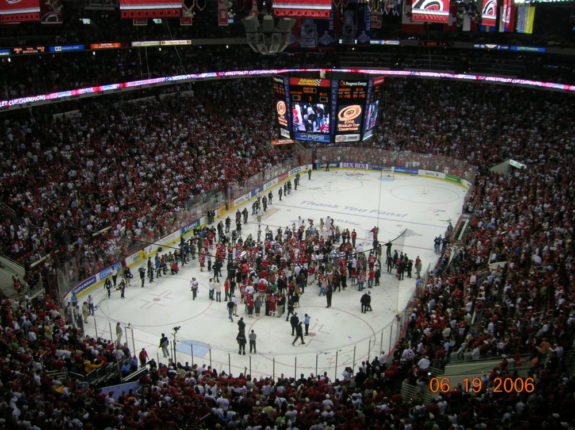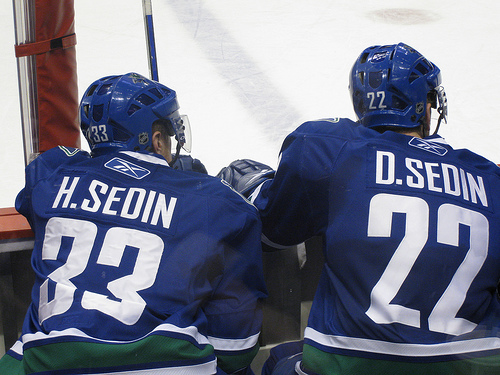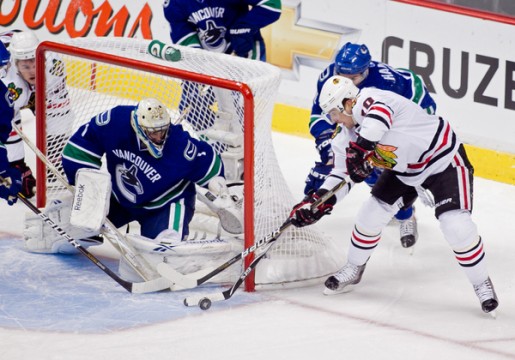Who could ever fault a team for squeaking into the playoffs and making the best of their situation? How could you justify knocking a team who seized an opportunity for their franchise and won the Stanley Cup in a complete surprise? I don’t think you could find a hockey fan that would deny those are some of the best stories to follow during not only the Stanley Cup Playoffs, but any championship run. The underdog- sports fans seem to like them.
This is what the Carolina Hurricanes did in 2006 when they won their franchise’s first Stanley Cup. They weren’t a favourite, but their regular season record of 52-22-8 for 112 points- 21 points above the league average- sure showed potential.

Two key factors in the Canes future heading into the 2006-2007 Stanley Cup Hangover season had to be a carryover for Eric Staal and Cam Ward. Their play not only in the regular season and playoffs was a major factor in the development and future success of this team.
In 82 regular season games leading up to the Hurricanes first Championship (2005-06), a 21-year-old Eric Staal impressed with 45 G and 55 A for 100 points. This was no fluke and his play in the playoffs only continued on the impressive road of production for such a young NHL talent. In 21 playoff games, Staal scored 9G, 19A, for 28 points. It is important to have not just 1, but many contributors during a Stanley Cup run. This success was not solely Staal’s. Justin Williams, Cory Stillman, and Rod Brind’Amour combined for 222 points on the regular season. The same guys showed up for a combined total of 62 points in the playoffs.

When your own guys haven’t slowed down from the regular season to playoff time, it only means good things. Even more promise is shown when others contribute to a playoff run scoring points they didn’t in the regular season. Matt Cullen, Mark Recchi, Doug Weight, and Ray Whitney combined for 65 points during the 2006 Cup run.
Cam Ward was thrust into the role of starting goaltender playing 23 games for the Canes with a record of 15-8, a .920 save percentage, and 2.14 goals against. Martin Gerber started 6 games for the Hurricanes totalling only 1 win and 1 loss. A save percentage of .856 and a GAA of 3.53 tells that story.
All the pieces have to fall together at the right time. Unlikely heroes have to emerge. If one player goes down, another comes and takes his place possessing playoff powers you never knew he had. A great playoff run, or successful playoff run sets up the franchise for it’s future. Eric Staal took over Captaincy from Rod Brind’Amour during his last year in the NHL before retirement. Staal is still one of the most skilled and productive Hurricanes. Cam Ward remains the Hurriances number 1 goaltender, no controversy in sight.
What happens when you can’t find that success? The Vancouver Canucks happen.
The Carolina Hurricanes failed to make the playoffs from 2002-2004. When they made it the year they eventually won the Stanley Cup, they didn’t let that opportunity go by. Just three years before in the 2001-02 Stanley Cup Final, they lost 4 games to 1 to the Detroit Red Wings. The Hurricanes got themselves an Eric Staal and a Cam Ward, came back in 2006 and finished their business.

The Canucks have been sitting on the edge of the pool, just dipping their toes in. Let’s only go back to the Alain Vigneault era to really hone in on what hasn’t gone right. Alain Vigneault became coach of the Vancouver Canucks in the 2006-07 NHL season. The core players that had dressed for the Canucks in 2006-07 have stayed with the team up until last nights 4 game sweep by the San Jose Sharks.
The core players in 2006’s season were Daniel and Henrik Sedin, Markus Naslund, Brendan Morrison, Roberto Luongo, and Kevin Bieksa. By far the most productive players on their roster scoring over 40 points each, the Sedin’s scoring a combined 165 points. Four of the six aforementioned players are still on the Canucks roster. That year, they finished with a regular season record of 49-26-7, winning in game 7 against the Dallas Stars to move on to the Anaheim Ducks in the playoffs. The Ducks would win that series 4 games to 1. The scoring leaders for the Canucks in that playoff run were Trevor Linden, Mattias Ohlund and Taylor Pyatt. None of the regular season contributors eclipsed the same level of play as in the regular season. Nonetheless, not a bad turnout for Vigneault’s first year coaching.
Next year would surely be the year they put it all together and, like the Hurricanes, seize the opportunity of a similar roster to make a legitimate run. Not so much… the Canucks missed the playoffs with a record of 39-33-10.
2008-2009 was the year the Canucks would be favourites to go deep into the playoffs. This prediction would continue for a few seasons. Their main contributors on the roster included Kevin Bieksa, Alexandre Burrows, Pavol Demitra, Ryan Kesler, and Henrik and Daniel Sedin. Roberto Luongo’s record was 33-13-7 with a 2.34 GAA. They finished the season 45-27-10 for 100 points.

The team would see production in the playoffs from Henrik and Daniel Sedin, and Mats Sundin. Roberto Luongo also put up nice numbers with .914 SV% and 2.52 GA. The Canucks would be eliminated in the second round by their budding rival the Chicago Blackhawks 4 games to 2.
Getting past the second round would be an issue for the next season as well being eliminated again by the Blackhawks on their way to win the 2010 Stanley Cup. 2010-2011 was the year to make their move. They had been in the mix for years, and the window was starting to close on their opportunity to win the Cup.
Finishing their season first in the west with a record of 54-19-9 for 117 points, the Canucks were the cup favourite again, and the team to beat. The regular season was of course dominant seeing the Sedin’s score a collective 198 points, Ryan Kesler with 73, Mikael Samuelsson with 50 as well as Christian Ehrhoff, and Alex Burrows with 48. If they didn’t get past the second round this year, it would spell trouble for Alain Vigneault’s job.
All top 6 points leaders from the Canucks managed to carry over their regular season success into the playoffs. This spelled disaster for the teams they were to face. Chicago was a tough series, but they won in 7. The Nashville predators were next to fall to the Canucks in 6, and the San Jose Sharks were eliminated 4 games to 1. Stanley Cup Final: Vancouver Canucks and Boston Bruins. The one factor going into this series was the play of Roberto Luongo. He posted similar numbers in other successful seasons, but had been pulled 5 times in favour of backup Cory Schneider. The Canucks would lose in 7 to the Bruins.
http://youtu.be/vvY-VXdfZoU
The next two seasons after their game 7 loss to the Boston Bruins in the Stanley Cup Final saw them fail to move past the first round of playoffs. Losing 4-1 to Los Angeles- the eventual 2012 Stanley Cup Champions- and being swept just last night by the Sharks shows the time to win has come and gone.
All the tools were there, the production was there, and the coaching was there. It didn’t come together. Not everything works out the way it should, or the way you want it to.
Hey Alain Vigneault… We are available to help clean out your office when you are fired tomorrow. Just let us know what time.
— Green Men (@TheGreenMen) May 8, 2013
The Carolina Hurricanes switched coaches after losing the Stanley Cup Final to the Detroit Red Wings and missing the playoffs in back to back seasons. After the coaching change, Peter Laviolette coached the Hurricanes to their first ever Stanley Cup Championship. Maybe it’s time for a change in Vancouver. I can’t say Alain Vigneault’s job is safe, (although the lack of production in unsuccessful playoff runs is not his fault) I can’t see him staying considering the decline of the team since their game 7 Stanley Cup Final loss to Boston in 2011. But a change of system, scenery, or attitude may be what Vancouver needs to salvage the era they will lose if they don’t find a way to pry open the window that is closing and get back into a Stanley Cup Final. The Canucks could turn this into an era of firsts, instead of an era of “what ifs”.